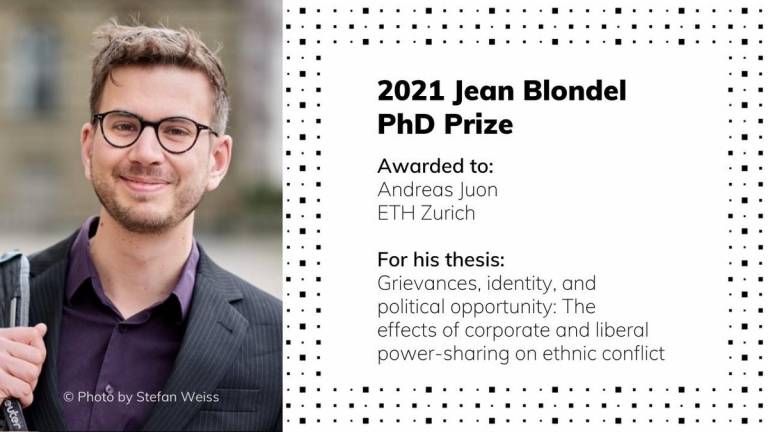Andreas Juon's 'fascinating' thesis wins this year's Jean Blondel PhD Prize
9 November 2021

We are delighted to announce that the winner of the 2021 Jean Blondel PhD Prize is Andreas Juon, for his thesis Grievances, identity, and political opportunity: The effects of corporate and liberal power-sharing on ethnic conflict (University College London, 2020). This annual prize, introduced in 2003, celebrates the best thesis in politics, broadly conceived to include international relations, political theory and public administration.
'I feel excited and very honoured at this privilege! I am extremely grateful for all the support which I received along the way to finishing this dissertation. Most importantly, this includes my incredibly helpful PhD supervisors, Kristin M. Bakke and Nils W. Metternich, and all my colleagues and friends at University College London, who have created an exceptionally warm and supportive environment.'
Since 2020, ECPR has presented its prizes virtually. They have therefore created this short video with Petra Meier, our Jury Chair, Andreas’ supervisors Kristin M. Bakke and Nils W. Metternich, and Andreas himself, to celebrate the occasion.
About the winner
In his dissertation, he analyses the consequences of power-sharing arrangements for ethnic conflict. He argues that these should be understood in a triple-disaggregated manner, considering different institutional types of power-sharing, types of ethnic groups, and time horizons. The analysis relies on a new global dataset of constitutional power-sharing for 1945-2018, which he has collected and used in several published articles on the exclusion of micro-minorities and democratisation.
His most recent publication in this research stream, co-authored with Daniel Bochsler and published in European Political Science Review, considers the contradictory consequences of power-sharing institutions for key aspects of democratic quality in 70 democracies since the end of the Cold War. In several working papers, he further extends his research on the trade-offs entailed by attempts to institutionalise inter-ethnic peace. In this vein, he investigates the consequences of territorial autonomy both for civil and communal violence, focusing on the implications of how administrative boundaries are drawn. For this purpose, he relies on new spatial data he has collected, comprising subnational administrative boundaries since the Second World War.
He currently works as a postdoc in Lars-Erik Cederman's International Conflict Research group at ETH Zurich, having obtained funding from the ETH Fellows programme. In this ongoing project, he extends his PhD research by systematically examining ethnic majority mobilisation against minority accommodation since the end of the Cold War. Relatedly, he has also conducted prior research on the emergence of populist parties, with a particular focus on Central and Eastern Europe. An overview of Andreas' research programme and its background has previously appeared on ETH news.
 Close
Close

